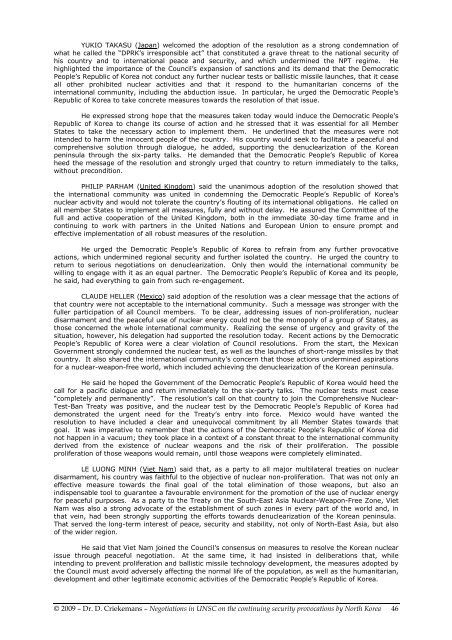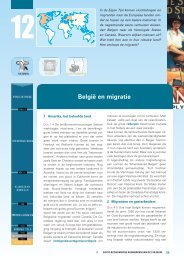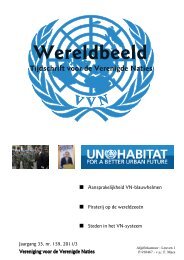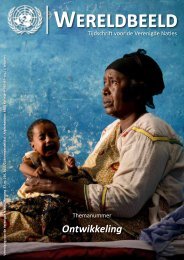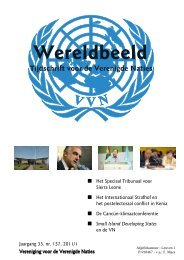Annex 5: United Nations Security Council Resolution 1874 (2009)
Annex 5: United Nations Security Council Resolution 1874 (2009)
Annex 5: United Nations Security Council Resolution 1874 (2009)
You also want an ePaper? Increase the reach of your titles
YUMPU automatically turns print PDFs into web optimized ePapers that Google loves.
YUKIO TAKASU (Japan) welcomed the adoption of the resolution as a strong condemnation of<br />
what he called the “DPRK’s irresponsible act” that constituted a grave threat to the national security of<br />
his country and to international peace and security, and which undermined the NPT regime. He<br />
highlighted the importance of the <strong>Council</strong>’s expansion of sanctions and its demand that the Democratic<br />
People’s Republic of Korea not conduct any further nuclear tests or ballistic missile launches, that it cease<br />
all other prohibited nuclear activities and that it respond to the humanitarian concerns of the<br />
international community, including the abduction issue. In particular, he urged the Democratic People’s<br />
Republic of Korea to take concrete measures towards the resolution of that issue.<br />
He expressed strong hope that the measures taken today would induce the Democratic People’s<br />
Republic of Korea to change its course of action and he stressed that it was essential for all Member<br />
States to take the necessary action to implement them. He underlined that the measures were not<br />
intended to harm the innocent people of the country. His country would seek to facilitate a peaceful and<br />
comprehensive solution through dialogue, he added, supporting the denuclearization of the Korean<br />
peninsula through the six-party talks. He demanded that the Democratic People’s Republic of Korea<br />
heed the message of the resolution and strongly urged that country to return immediately to the talks,<br />
without precondition.<br />
PHILIP PARHAM (<strong>United</strong> Kingdom) said the unanimous adoption of the resolution showed that<br />
the international community was united in condemning the Democratic People’s Republic of Korea’s<br />
nuclear activity and would not tolerate the country’s flouting of its international obligations. He called on<br />
all member States to implement all measures, fully and without delay. He assured the Committee of the<br />
full and active cooperation of the <strong>United</strong> Kingdom, both in the immediate 30-day time frame and in<br />
continuing to work with partners in the <strong>United</strong> <strong>Nations</strong> and European Union to ensure prompt and<br />
effective implementation of all robust measures of the resolution.<br />
He urged the Democratic People’s Republic of Korea to refrain from any further provocative<br />
actions, which undermined regional security and further isolated the country. He urged the country to<br />
return to serious negotiations on denuclearization. Only then would the international community be<br />
willing to engage with it as an equal partner. The Democratic People’s Republic of Korea and its people,<br />
he said, had everything to gain from such re-engagement.<br />
CLAUDE HELLER (Mexico) said adoption of the resolution was a clear message that the actions of<br />
that country were not acceptable to the international community. Such a message was stronger with the<br />
fuller participation of all <strong>Council</strong> members. To be clear, addressing issues of non-proliferation, nuclear<br />
disarmament and the peaceful use of nuclear energy could not be the monopoly of a group of States, as<br />
those concerned the whole international community. Realizing the sense of urgency and gravity of the<br />
situation, however, his delegation had supported the resolution today. Recent actions by the Democratic<br />
People’s Republic of Korea were a clear violation of <strong>Council</strong> resolutions. From the start, the Mexican<br />
Government strongly condemned the nuclear test, as well as the launches of short-range missiles by that<br />
country. It also shared the international community’s concern that those actions undermined aspirations<br />
for a nuclear-weapon-free world, which included achieving the denuclearization of the Korean peninsula.<br />
He said he hoped the Government of the Democratic People’s Republic of Korea would heed the<br />
call for a pacific dialogue and return immediately to the six-party talks. The nuclear tests must cease<br />
“completely and permanently”. The resolution’s call on that country to join the Comprehensive Nuclear-<br />
Test-Ban Treaty was positive, and the nuclear test by the Democratic People’s Republic of Korea had<br />
demonstrated the urgent need for the Treaty’s entry into force. Mexico would have wanted the<br />
resolution to have included a clear and unequivocal commitment by all Member States towards that<br />
goal. It was imperative to remember that the actions of the Democratic People’s Republic of Korea did<br />
not happen in a vacuum; they took place in a context of a constant threat to the international community<br />
derived from the existence of nuclear weapons and the risk of their proliferation. The possible<br />
proliferation of those weapons would remain, until those weapons were completely eliminated.<br />
LE LUONG MINH (Viet Nam) said that, as a party to all major multilateral treaties on nuclear<br />
disarmament, his country was faithful to the objective of nuclear non-proliferation. That was not only an<br />
effective measure towards the final goal of the total elimination of those weapons, but also an<br />
indispensable tool to guarantee a favourable environment for the promotion of the use of nuclear energy<br />
for peaceful purposes. As a party to the Treaty on the South-East Asia Nuclear-Weapon-Free Zone, Viet<br />
Nam was also a strong advocate of the establishment of such zones in every part of the world and, in<br />
that vein, had been strongly supporting the efforts towards denuclearization of the Korean peninsula.<br />
That served the long-term interest of peace, security and stability, not only of North-East Asia, but also<br />
of the wider region.<br />
He said that Viet Nam joined the <strong>Council</strong>’s consensus on measures to resolve the Korean nuclear<br />
issue through peaceful negotiation. At the same time, it had insisted in deliberations that, while<br />
intending to prevent proliferation and ballistic missile technology development, the measures adopted by<br />
the <strong>Council</strong> must avoid adversely affecting the normal life of the population, as well as the humanitarian,<br />
development and other legitimate economic activities of the Democratic People’s Republic of Korea.<br />
© <strong>2009</strong> – Dr. D. Criekemans – Negotiations in UNSC on the continuing security provocations by North Korea 46


